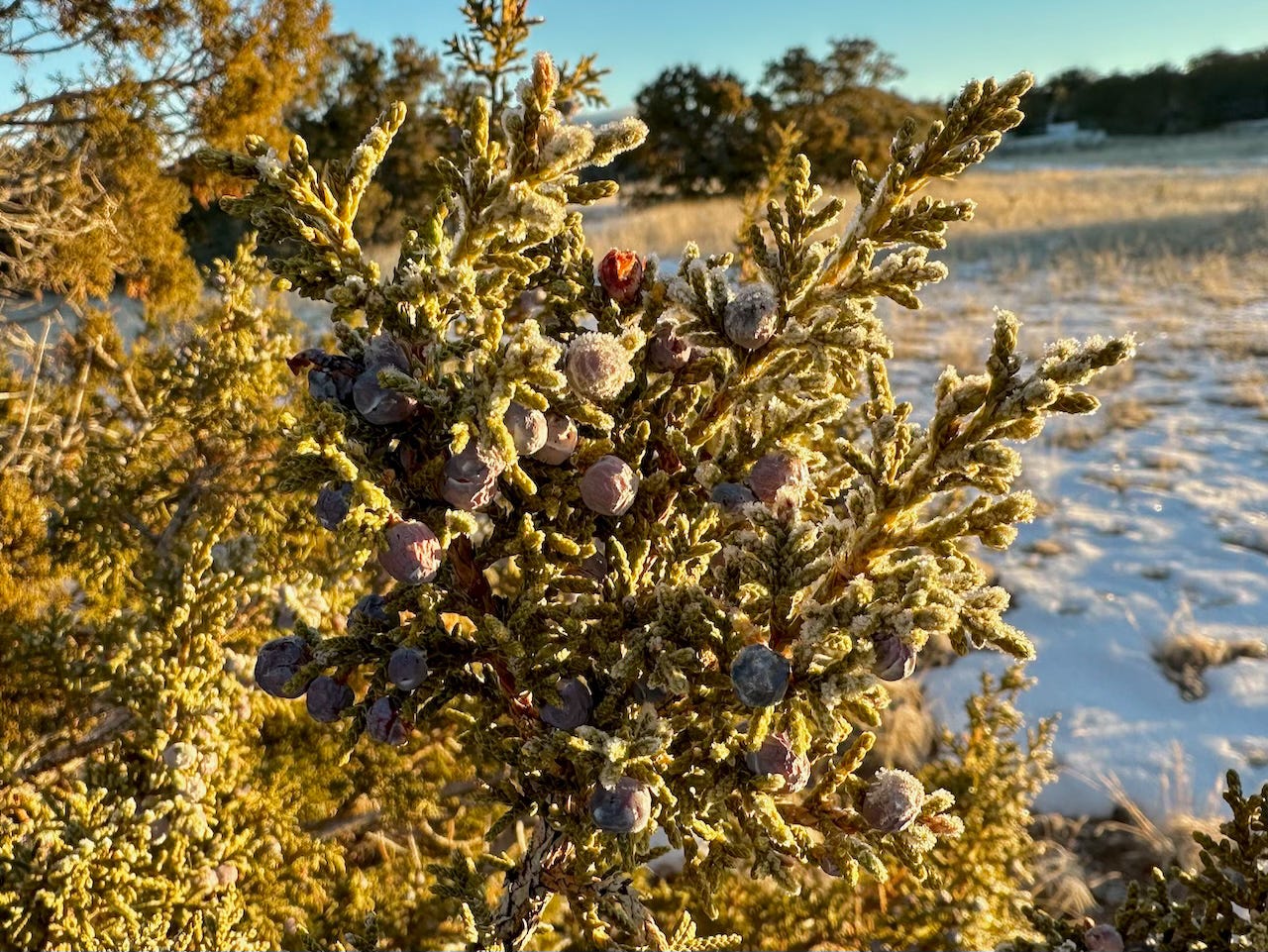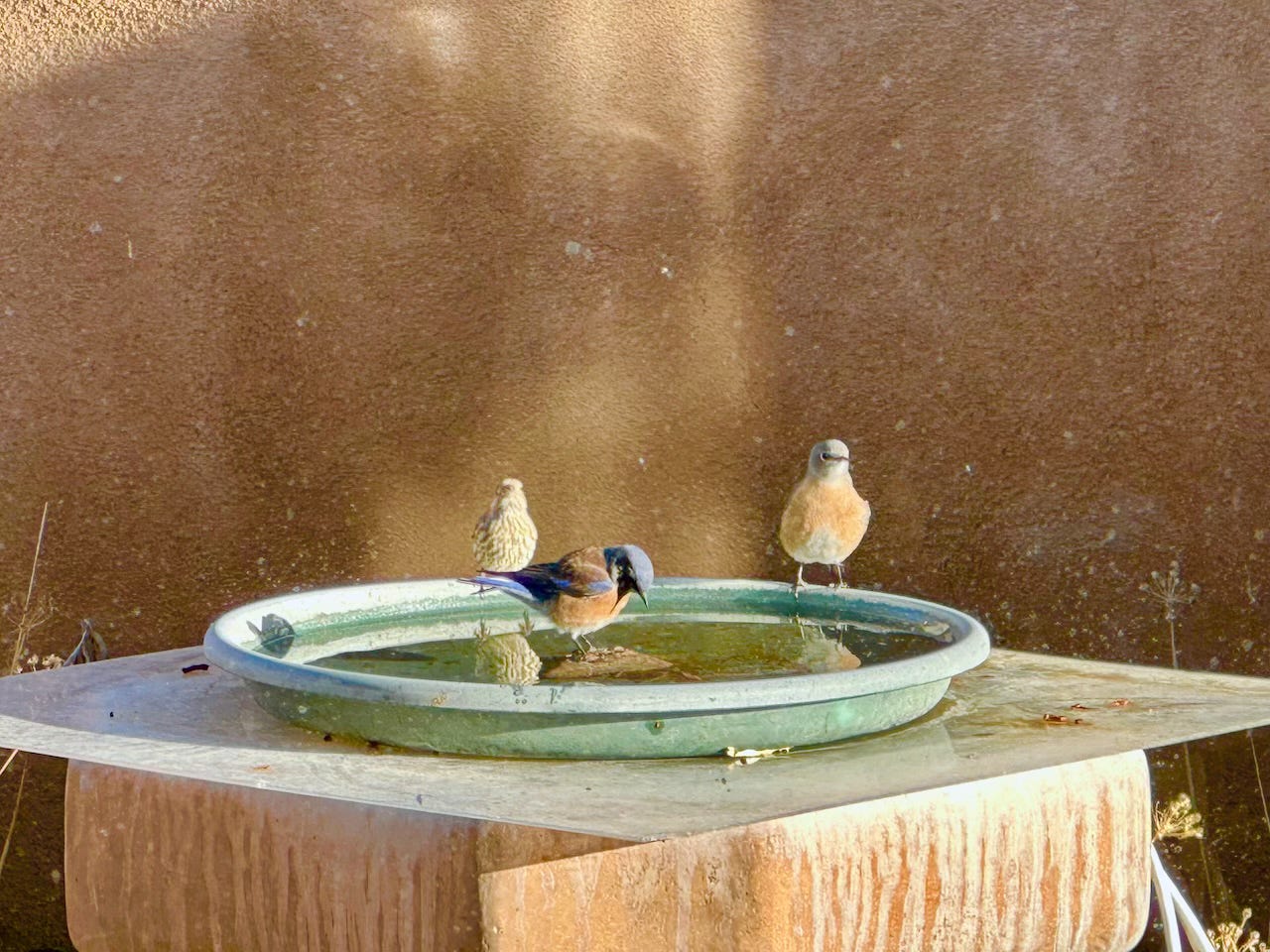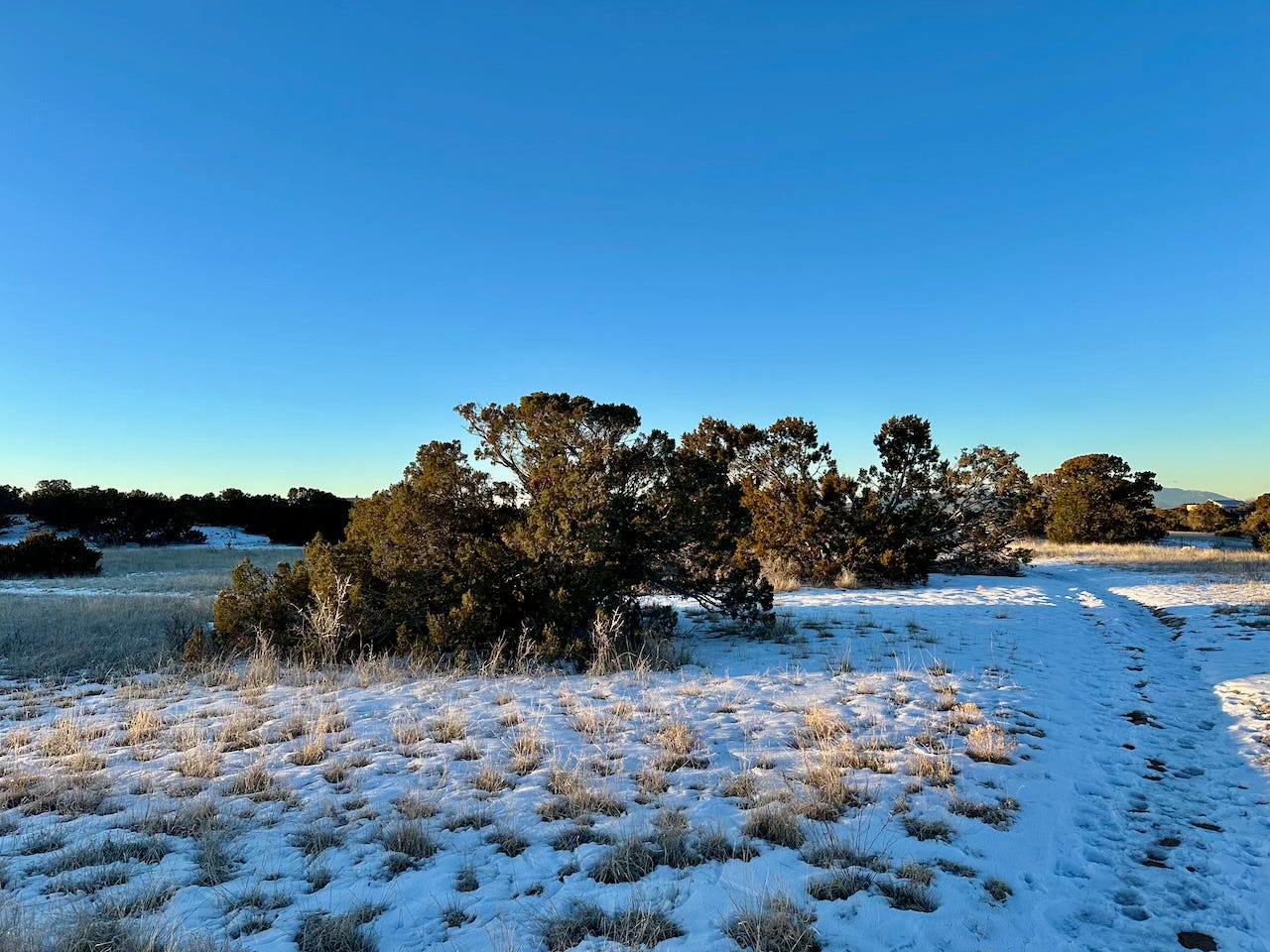navel-gazing? male bluebird peers at azure reflection female twitters
The bird bath in my front courtyard attracts western bluebirds in pairs and flocks. This male seemed particularly drawn to his reflection in the water. Perhaps he thought it was a rival male, or perhaps he was just admiring his gorgeous blue plumage!
Hello Friends! It’s Tuesday and time for some gratitude to lighten these turbulent times. Today I am grateful for junipers, specifically Juniperus monosperma, one-seed juniper, the multi-trunked, wider-than-tall trees that dot the prairie where I live.
I hear that collective groan from all who are allergic to juniper pollen (I am too). How can she be grateful for junipers? Read on, and perhaps you’ll see these small trees in a new light.
Without one-seed juniper and the tree’s abundant crops of berries, my winter days would not be enlivened by the azure feathers and harp-string melodic calls of western bluebirds. Nor the flocks of American robins who winter here by the hundreds. Nor the Townsend’s solitaires, thrush relatives who are usually quiet and—true to their name—solo, but whose fluting calls always make me smile.
These songbirds and others migrate south or downhill to winter in the juniper woodlands because of the food the trees offer, those blue-purple berries. Which are actually cones covered with a waxy, fleshy layer full of antioxidants and lipids and aromatic oils, a highly nutritious winter food for birds.

One-seed juniper berry-cones begin as hard, green pellets in summer and ripen and soften over one or two years into the plump, waxy, blue-purple globes that attract wintering flocks of songbirds. The color, shape and size of these fruiting bodies are optimized to attract birds, who pluck them with their beaks and swallow each one whole.
The bird’s digestive system liquifies the fleshy part, and excretes the woody cone scales and the seed. Which, according to Audrey Della Benedict in her charming and encyclopedic The Naturalist’s Guide to the Southern Rockies, “tends to germinate faster” after the seed’s trip through the bird. Benedict also notes that the berry-cone’s high concentration of aromatic oils are what flavor gin.
Those spicy and resiny aromatic oils also permeate the tree’s foliage and wood, acting as deterrents to grazers of all sorts, from fungi to pronghorn antelope. Which is why juniper wood is used for fence posts (it doesn’t rot), the lining of cedar chests and closets (it repels clothes moths and other insects) and why it smells so good and burns so hot in my fireplace.
(Junipers are called cedars east of the Rockies, but they’re all in the same genus, Juniperus, although some taxonomists call them Sabina. Naming can be confusing!)
Junipers also provide life-saving thermal protection for birds and small mammals in winter and summer, sheltering them from the prairie’s bitter cold and sweeping winds, as well as summer’s searing sunlight.
And that pollen that causes such misery in spring? I’m with you on not loving it, but without the pollen, there would be no berry-cones and no wintering bluebirds. I’m willing to live with a few months of itching eyes and a honking nose for those twittering voices and flashes of brilliant azure feathers in winter. And the gin….
Junipers, with their advantages and drawbacks, remind us that nothing in life is simple. And that learning to appreciate—or at least tolerate—the complexities is part of loving this world.
Do you have junipers where you live? Hit the comment button and share your experience with these small but fascinating trees.






Juniper has a long history of medicinal use, which may be the origin of its use as an alcohol flavoring. In fact, the word "gin" is derived from the Dutch word "jenever." (The Dutch were the original brewers of gin.) The plant is under serious threat (overuse and disease) in Europe, while in the U.S., it is a threat to our prairies: https://www.aaas.org/news/juniper-invasion-poses-profound-threat-prairies-researchers-say-aaas-swarm-meeting
Thank you for this, Susan! I enjoy your posts so very much!
i love reading others' notes on juniper. i taught that class on the ethnobotany of juniper last winter in paonia and a few winters before that too. there's always a wealth more to know about them it seems.
The cedar thing is confusing, especially since true cedars from the etymological/taxinomical sense are actually Pines (Cedrus genus) but alas in our naming out botany forefathers called a lot of things cedar.. The Eastern Red Cedar you refer to as the Juniper east of the rockies, I have started calling Eastern Juniper by habit but what is confusing there is that there is also Atlantic White Cedar Chamaecyparis thyoides) which is threatened due to habitat loss and fire suppression (and yet the Juniperus virginiana is so abundant due to the fire suppression) and the northern White Cedar which is a Thuja. Common names get weird for sure...
And I've heard that gin was mainly made from the J. communis species mainly, in Europe (which grows along the proper J. sabina there that some say is poisonous?) but here in the U.S. where we have tons of different Junipers... that people have been experimenting with making more bioregional gin with other species including one seed and the communis here. It's interesting how they have all have such varying flavor compounds.